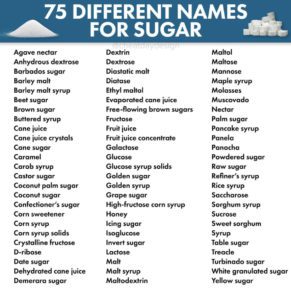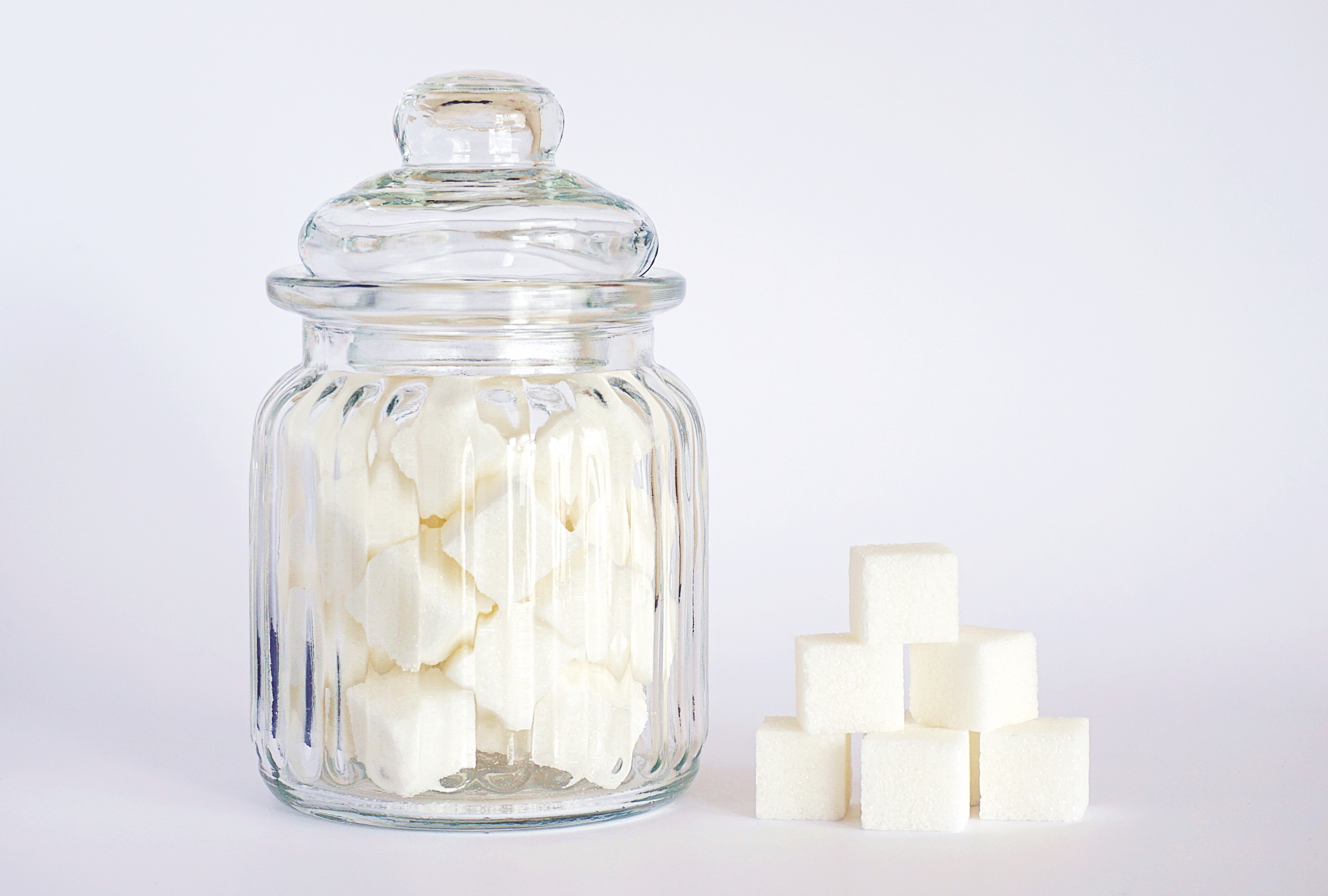
First, A Bit About Sugar
There are different types of sugars, but some of the better-known sugars are fructose, galactose, maltose, lactose, including sucrose and glucose. Sugars belong to the carbohydrate family, and they are either monosaccharides or disaccharides. Some sugars digest and absorb in the gut, and some sugars cannot be absorbed; these are referred to as digestible and indigestible. One way the body works is by keeping the organs and tissues in a constant environment. For example, anything that makes your blood sugar rise or fall is followed by actions that try to restore it to normal. These actions are controlled by your nervous system and mostly by hormones. If, for any reason, the control mechanisms are not working correctly (i.e., insulin resistance), this will create an excessive amount of sugar in the blood (hyperglycemia) or a deficient amount of sugar in the blood (hypoglycemia). The most common cause of hyperglycemia is diabetes, but both hypoglycemia and hyperglycemia can be quite dangerous.
How Does Sugar Affect The Body
When thinking about sugar and the effects sugar has on the body, it should be noted that the brain depends on glucose (sugar) for immediate energy. Without glucose, the brain would struggle to work correctly, and it appears that the hypothalamus plays a critical role in sugar cravings. For some people, the cravings may cause them to eat or crave certain other foods more than they should, and it also could encourage other poor dietary choices.
Sugar cravings can be very subtle, but this varies for each individual. Paying close attention to the symptoms of sugar cravings is essential if you want a better understanding of your energy levels as well as your health. Let’s look at sugar caving and symptoms.
First, for anyone who is trying to lose or maintain weight, certain sugars very quickly send your blood sugar spiking, which triggers a flood of insulin into your bloodstream. Excess insulin sets you up for insulin resistance and also cues your body to store fat.
Second, sugar nourishes the “BAD” bacteria in your microbiome and causes IMBALANCES in your gastrointestinal tract. Your “Microbiome” is the totality of microorganisms and their collective genetic material present in and on the body. It is a miniature world made up of trillions of microscopic, nonhuman organisms that flourish within your gastrointestinal tract. These intestinal organisms (i.e., bacteria) digest your food, govern your appetite, control your metabolism, and orchestrate your immune system, influence your mood, and determine how your genes get expressed. These intestinal organisms have a significant impact on whether your heart is healthy, your bones develop properly, and whether your brain feels sharp and clear. The incredible thing about these nonhuman organisms is they make up 90 percent of your cells – WOW! And consuming to much SUGAR can affect all of these essential bodily functions?
What About Artificial Sweeteners
If you think artificial sweeteners are ok, think again. Sorry, but artificial sweeteners can create health and weight problems too. There is supporting research that reveals artificial sweeteners like Nutrasweet and Equal break down into harmful compounds such as formaldehyde, and Splenda (Sucralose) maybe associated with Leukemia. Also, Splenda (Sucralose) can cause your blood level to spike, and consequently, your insulin will spike as well. Scientists have concluded that artificial sweeteners can cause insulin resistance, weight gain, increased hunger, cravings, and depression. If you must eat sugar there are plant-based sugars that can be healthy substitutes used in moderation (i.e., Yacon, Lakanto). Keep in mind these healthy options are not as low in calories as artificial sweeteners, but they are better for you, and they do provide some nutrients for your body.
Why Do We Get Addicted to Sugar?
Although sugar is not a drug per se, it acts similarly to other substance abuse such as alcohol and other illicit drugs. One of the first and most noticeable causes of sugar addiction is that the brain wants sugar. The brain needs sugar (glucose) as a fuel source, and your brain will continuously attempt to get glucose as a way to prevent a potential shortage of this nutrient. If you notice that you constantly want sugar, the primary culprit is your brain controlling your thoughts.
The Sugar High
A sugary treat can cause a rush of both glucose and endorphins in your bloodstream and will create a short burst of energy. However, the sugar burst usually doesn’t last very long and is followed by a fast crash in energy. Ever wonder why you feel sluggish, depressed, or foggy-brained after eating something sweet? It’s all due to a sharp decrease in your blood sugar levels.
Your Taste Buds
Your taste buds, located on your tongue, is another reason why we get addicted to sugar. There are small receptors on your tongue, and It is possible over time that these taste buds stop working properly, which can cause a stronger desire to eat sugar. If you smoke, I’m sure you are aware of the many deadly diseases linked to smoking, but also your taste buds are increasingly diminished. So if you are trying to stop eating sugar, you might consider trying to quit smoking as well.
Convenience foods in our Grocery Stores
Are you aware that sugar is literally in almost all foods you buy in the grocery store, such as bread, can soup, pasta sauce, ketchup, salad dressings, and most other foods in a box or processed. And you wonder why you are addicted to sugar, well this is one of the reasons. So why is this their sugar in most foods? Because adding sugar to foods increases the chances that you, the consumer, will continue to purchase the food because it tastes better, and it’s cheaper for your budget. Corn, which is subsidized in the US, is used to manufacture high-fructose corn syrup that is added to food, which makes it cheaper than whole foods, organic foods, or grass-fed meats.
To Much Sugar causes Increased Fat Storage
A diet high in sugar can increase the amount of fat your body stores. Even though sugar is not in itself fatty, the excess sugar you eat is converted to fat and stored for future energy needs. So also though you may have switched to a low-fat diet in an attempt to lose weight, it is important to keep an eye on your sugar consumption. Try eating Whole Foods and avoiding fast-food and processed foods.
Ideals to Help You Reduce Sugar Cravings
Now that you are aware of the many health consequences to high sugar consumption here are a few suggestions to help reduce your sugar craving, and remember while it may seem like it should be easy to stop eating sugar, sugar is as addictive as alcohol, cocaine, and other illicit drugs. Cravings can be a significant challenge in the fight against any addiction, so having a plan and support will help.
Choose Healthy Alternatives
Try swapping sweet foods with healthy alternatives like vegetables. Yes, vegetables can be sweet, but the natural sugars you find in carrots, beets, sweet potatoes, and peas are much lower than what you’ll find in treats such as cookies, chocolate, or donuts, and the added fiber will keep your blood sugar from spiking.
Clean Your Pantry
It is important to eliminate any temptations in your home. Your home is where you are likely to have a craving before bed or after a long day at work, so keeping tempting foods out of reach can make it much harder to give in to your cravings. Consider ditching all cookies, crackers (yes, there is sugar in crackers), candy, chocolate (sorry, it is for the best), fruit snacks, dried fruit, juices, and cereals that have any added sugar in them. This is not meant to be a punishment or a way to change your diet completely; rather, it is intended to give you every opportunity to succeed so that you can be as healthy as possible.
Be Aware of Hidden Sugar Substitutes and Alternative Names
Cutting sugar out of your diet can be a challenge and the first thing people do look to “sugar-free” products and diet sodas. However, be aware of marketing ploys such as “no sugar added” or “sugar-free” because they have artificial sweeteners in them. The best example of this is a sugar-free dessert. If you see this in a grocery store, the chances are that cupcake is not sugar-free, but instead made with a sugar substitute such as Splenda or Nutrasweet. As stated above sugar substitutes can have adverse health and weight consequences.
Below is a list alternate names for sugar, but this by no means is a complete list.

Cut Back on Alcohol
There are a few reasons to reduce alcohol consumption, but in your fight to reduce sugar, remember many alcoholic drinks, especially mixed drinks, contain sugar. And having something sweet makes you crave more sweets. That means when you drink a few too many, your inhibitions are lowered, and you’ll likely be tempted to eat sweets and make other bad dietary choices. Consider drinking in moderation, and if you are having a drink to be social, have a beer, a glass of red wine, or a spritzer as preferable options.
Have a Shopping and Food Plan
The last small tip for fighting your sugar addiction is to generate a plan and a shopping list for how you will eat. You can write this plan out, post it somewhere, or keep a mental note of it, but a plan can help you to succeed in various situations. For example, keep carrot sticks cut up in your fridge so that after work, you can plan to snack on those instead of cookies. Or if you’re going out to brunch, decide what you plan to order an omelet with vegetables so that pancakes (basically, a maple syrup delivery device) is not an option. The idea here is to have a plan for how you will succeed in various scenarios that typically create problems for you.
I hope you found this post interesting. Let me know if you are trying to reduce sugar in your diet, and if so, what have you tried?
Dr. Darlene EdD, MA, MCHC
Sources:
Pure, White, and Deadly, How Sugar is Killing Us and what We can do to Stop It- John Yudkin
Sugar: The Bitter Truth – Robert Lustig, MD
The Microbiome Diet – Dr. Rapheal Kellman
Grain Brain: The Surprising Truth about Wheat, Carbs, and Sugar – Your Brain’s Silent Killers – David Perlmutter, MD
Daily bingeing on sugar repeatedly releases dopamine in the accumbent shell – P. Rada









Amazing read!! Thank you!